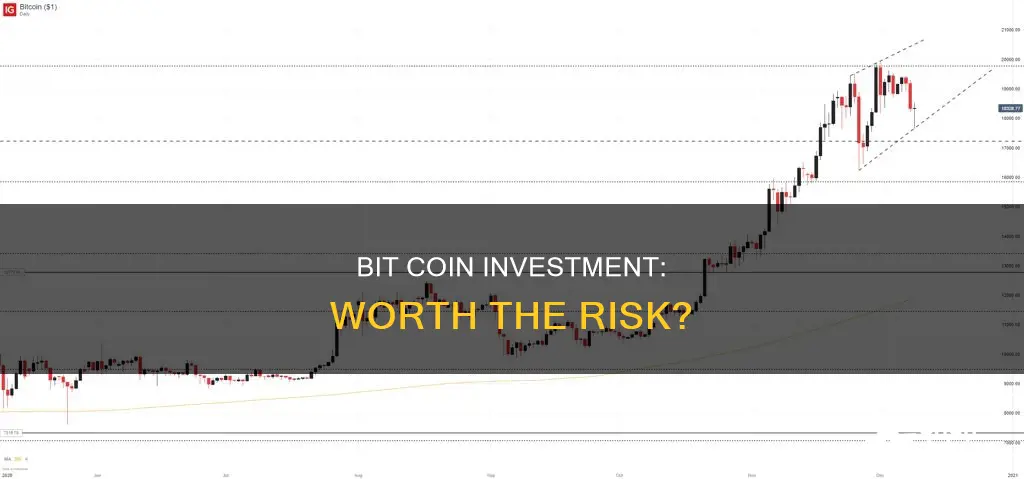
Bitcoin is a cryptocurrency, a virtual or digital currency, that has become increasingly popular among investors. It is a decentralised currency based on blockchain technology, which means it is immune to government interventions. Bitcoin's value is influenced by its restricted supply and increasing demand. It is divisible, portable, durable, and uniform, making it a good store of value and a unit of exchange. However, it is also highly volatile and susceptible to market manipulation, making it a speculative investment. While some critics argue that Bitcoin is too inefficient and volatile to be a reliable currency, others believe that it is already more efficient than credit cards and that its volatility will decrease as the market matures. Ultimately, investing in Bitcoin is a personal decision, and investors should carefully consider the risks and rewards before adding it to their portfolio.
What You'll Learn
- Bitcoin's value is based on its restricted supply and increasing demand
- Bitcoin is highly volatile and susceptible to market manipulation
- Bitcoin is inefficient for daily payments
- Bitcoin relies on massive computing power, leading to environmental concerns
- Bitcoin's decentralised nature makes it harder for governments to restrict it

Bitcoin's value is based on its restricted supply and increasing demand
The supply of an asset plays a crucial role in determining its price. A scarce asset tends to have a higher price, while an asset available in abundance will generally have a lower price. Bitcoin's limited supply is well-known and carefully controlled, with a fixed rate of new bitcoins being released over time. This controlled supply ensures that Bitcoin remains scarce, contributing to its high value.
On the other hand, demand for Bitcoin has been increasing due to various factors. Retail and institutional investors have shown greater interest in Bitcoin, fuelled by media coverage and endorsements from experts and business owners. Additionally, Bitcoin has become popular in countries with high inflation and devalued currencies, such as Venezuela. It is also widely used for transferring large sums of money, including for illicit activities. This surge in demand, coupled with limited supply, has contributed to the rise in Bitcoin's price.
Bitcoin's value is also influenced by other factors, such as competition from other cryptocurrencies, regulatory changes, and media coverage. However, its restricted supply and increasing demand remain the fundamental drivers of its value.
Bitcoin's unique characteristics, such as its decentralised nature, borderless transferability, and immunity to government interventions, have contributed to its popularity and increasing demand. As long as Bitcoin maintains its restricted supply and increasing demand, it is likely to remain a valuable asset in the future.
Bitcoin in November: Worth the Investment Risk?
You may want to see also

Bitcoin is highly volatile and susceptible to market manipulation
Bitcoin is highly susceptible to market manipulation and is volatile due to a combination of factors, including its relative infancy, investor actions, supply and demand, and geopolitical factors.
Bitcoin is still a relatively new concept and young asset class, and its value is subject to continuous adjustments as investors, users, and governments grapple with initial challenges and uncertainties. This process is known as price discovery, and it means that Bitcoin's value will fluctuate more as new participants continue to enter the market and try to establish a consensus on the fair value of digital assets.
Investor actions also play a significant role in Bitcoin's volatility. As the most popular cryptocurrency, Bitcoin's demand increases as its supply becomes more limited. Wealthier investors tend to hold their Bitcoins long-term, preventing those with fewer assets from gaining exposure. This dynamic can lead to panic selling or buying, influencing demand and, therefore, prices.
Bitcoin's price is also heavily influenced by supply and demand. As a highly sought-after asset with a limited supply of 21 million coins, any increase in demand can put even greater upward pressure on prices, increasing volatility. This pressure can be further compounded when large holders, often called whales, buy or sell significant quantities of Bitcoin, potentially sending its price soaring or tumbling.
Additionally, geopolitical tensions, regulatory changes, and macroeconomic factors can influence Bitcoin's volatility. As Bitcoin is considered a hedge against traditional financial systems, any events that threaten these systems can lead to increased demand, driving up prices, or panic selling, causing abrupt drops. For example, in 2021, China's government and central bank announced that all cryptocurrency transactions or facilitation were illegal, leading to a massive shutdown of cryptocurrency mining farms in the country and a drop in Bitcoin's price.
Finally, Bitcoin's volatility is also driven by the varying belief in its utility as a store of value and method of value transfer. Many investors believe that Bitcoin will retain its value and continue to grow, using it as a hedge against inflation and an alternative to traditional value stores like gold or other metals. This belief can further fuel demand and contribute to price volatility.
In summary, Bitcoin's volatility is a result of its relative infancy, investor actions, supply and demand dynamics, geopolitical factors, and beliefs about its utility as a store of value. As Bitcoin continues to mature and gain wider acceptance, its volatility may decrease, presenting both challenges and opportunities for traders and investors.
IRA Bitcoin Investment: Is It Possible?
You may want to see also

Bitcoin is inefficient for daily payments
Bitcoin's utility as a daily transaction medium is questionable, especially when compared with other networks like Ethereum, Solana, or Cardano, which offer greater scalability and transaction throughput. Bitcoin has a limited throughput of around five transactions per second, resulting in a backlog of transactions and higher fees. This issue has led to the emergence of layer-2 solutions like the Lightning Network, which aim to process payments more efficiently. However, the complexity of deploying such solutions and the increasing competition from other blockchains have made it challenging for Bitcoin to regain its position as the preferred choice for daily payments.
Bitcoin's high volatility and the regulatory risks associated with its unregulated status also contribute to its inefficiency for daily payments. The lack of clear guidelines and the potential for government intervention create uncertainty among users. Additionally, critics argue that Bitcoin is primarily used for illegal activities, such as money laundering and drug trafficking, further deterring its adoption for everyday transactions.
While Bitcoin has gained popularity as a long-term store of value, its use as a medium of exchange has been limited. The network's inability to process a high volume of transactions efficiently and the challenges posed by its layer-2 solutions make it impractical for daily payments. As a result, other blockchains with higher throughput and lower fees have become more attractive for remittances and peer-to-peer cash payments.
To conclude, Bitcoin's limitations in terms of scalability, transaction throughput, and regulatory risks make it inefficient for daily payments. The rise of competing blockchains and the complexity of layer-2 solutions have further hindered its adoption for everyday transactions. As a result, Bitcoin is unlikely to regain its position as the primary choice for remittances and peer-to-peer cash payments.
Free Ways to Earn Bitcoin: No Investment Needed
You may want to see also

Bitcoin relies on massive computing power, leading to environmental concerns
Bitcoin relies on a decentralised network of computers to validate transactions and mint new coins. This process, known as mining, involves solving complex mathematical equations and requires a lot of computing power. The energy intensity of crypto mining is a feature, not a bug.
Bitcoin's mining process is energy-intensive, with the cryptocurrency using more energy than some small countries. According to the Cambridge Bitcoin Electricity Consumption Index, Bitcoin uses an estimated 140 Terawatt-hours (TWh) of electricity annually, which is about 0.63% of global electricity use. This is more energy than is used by Pakistan and Ukraine. Other estimates place the figure even higher, at around 138 Terawatt-hours.
The energy used to power Bitcoin mining comes predominantly from fossil fuels. Researchers at the University of Cambridge report that most Bitcoin mining occurs in the U.S. (38%), China (21%), and Kazakhstan (12%). According to the Center for Strategic and International Studies, about 76% of the energy consumed in China is generated from coal and crude oil. The U.S. gets most of its electricity by burning fossil fuels, and Kazakhstan mainly uses fossil fuels. As a result, three countries that are heavily dependent on fossil fuels are responsible for around 72% of the world's Bitcoin mining.
The high energy consumption of Bitcoin has led to concerns about its environmental impact. A study published in Nature Climate Change warns that Bitcoin's emissions alone could push global warming above 2°C. The White House has also proposed a tax of up to 30% on Bitcoin miners in the U.S. due to its environmental impacts.
The energy-intensive nature of Bitcoin mining also has other consequences, such as the generation of significant electronic waste. Bitcoin mining hardware becomes obsolete roughly every 1.5 years, leading to a lot of e-waste. According to Digiconomist, the Bitcoin network generates approximately 72,500 tons of electronic waste annually.
While some argue that the benefits of Bitcoin outweigh its environmental impacts, there are alternative cryptocurrencies that are more environmentally friendly. These include cryptocurrencies that use a proof-of-stake mechanism, which does not require extensive computing power, as well as those with a more ethical focus, such as Seeds.
Should You Invest Your Pension in Bitcoin?
You may want to see also

Bitcoin's decentralised nature makes it harder for governments to restrict it
Bitcoin's decentralised nature is a key feature that makes it harder for governments to restrict. Bitcoin was conceived in 2008 as an attempt to alleviate trust in governments and banks, which were at a low ebb during the financial crisis. Bitcoin's decentralised nature means it is not issued or regulated by any central government authorities, making it immune to government interventions.
Bitcoin is a peer-to-peer electronic cash system that utilises a decentralised network. This means that peers can connect and make financial exchanges within a network without the need for mediation with a central node, such as a bank, financial institution, or government. This is achieved through cryptography, which verifies and secures online transactions.
Bitcoin's decentralised nature also means that there is no single point of failure, so if one node breaks down, it will have no impact on the blockchain ledger. This makes the system more secure and less vulnerable to attacks. The blockchain ledger is a virtual chain of blocks, each of which contains a set of transactions and other information. Once a block is added to the chain, the data stored inside it cannot be removed or replaced.
The decentralised nature of Bitcoin also makes it more transparent and corruption-free. Anyone can view money transfer transactions by using the platform's blockchain explorer to track live transfers.
However, it is important to note that Bitcoin's decentralised nature does not mean it is completely free from government influence or regulation. Governments can still implement policies and laws that impact Bitcoin, such as taxes, anti-money laundering laws, and Know Your Customer laws. Additionally, if Bitcoin threatens countries' monopolies on money due to widespread adoption, governments could move to restrict it further.
The Next Big Thing: What's Outpacing Bitcoin?
You may want to see also
Frequently asked questions
Bitcoin is a highly volatile and speculative investment. Its value is based on supply and demand, and it is still in the early stages of adoption. While some people argue that its price is too volatile to be a reliable currency, others believe that its decentralised nature and protection against inflation make it a good investment.
Bitcoin functions as a store of value and a unit of exchange. It demonstrates the attributes of a currency, such as scarcity, divisibility, acceptability, portability, durability and uniformity.
Bitcoin's price is driven by supply and demand, as well as fear and greed. Its value is based on its restricted supply and increasing demand.
Bitcoin is not a risk-free investment. It is subject to market risks, cybersecurity risks and regulatory risks. It is also not insured by the Federal Deposit Insurance Corporation or the Securities Investor Protection Corporation.
You can invest in Bitcoin through a crypto exchange or by purchasing shares in a spot bitcoin ETF. It is important to do your research and understand the risks before investing.







